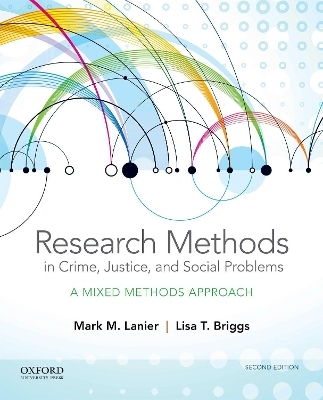
Research Methods in Crime, Justice and Social Problems
Oxford University Press Inc (Verlag)
978-0-19-069443-2 (ISBN)
Mark M. Lanier is Professor of Criminal Justice at the University of Alabama. Lisa T. Briggs is Associate Professor of Criminal Justice and Criminology at Western Carolina University.
PrefaceChapter 1. Why Research at All? The History of Research Good, Yet Critical, Science Research DistinctionsCritical Thinking ExercisesChapter 2. The Stages of Research: A General Overview Step One: Selecting a Research Topic Step Two: Identifying a Testable Research Question Step Three: Finding Research Step Four: The Literature Review Step Five: Research Design Step Six: Data Collection and Variable Coding Step Seven: Data Analysis Step Eight: Reporting of Results Step Nine: Conclusion and LimitationsFinal SuggestionsCritical Thinking ExercisesChapter 3. Research Ethics The Quest for a Perfect Study Common Ethical Principles Human Research Protection Program Institutional Review Boards Ethical Guidelines Other Ethical Notes The (Ever-Increasing) Role of the IRB Ethically Questionable StudiesFinal ThoughtsCritical Thinking ExercisesChapter 4. Validity and Reliability: Threats to Research Integrity Validity and Reliability Types of Validity Other Research ThreatsCritical Thinking ExercisesChapter 5. Qualitative Research Strategies Historical Synopsis of Qualitative Research Requisite Qualitative Research Tools Field Research Other Types of Qualitative Research Factors Influencing the Qualitative Data Collection ProcessSummaryCritical Thinking ExercisesChapter 6. Research Designs and Survey Research Operationalization and Coding Composite Measures Choosing a Research Design Experimental Research Experimental, Quasi-Experimental, and Pre-Experimental Designs Other Research Strategies Survey ResearchSummaryCritical Thinking ExercisesChapter 7. Mixed Methods Illustrations of Mixed Methods Mixed Methods for Program Evaluation Steps to Mixed Methods ResearchCritical Summary of the Mixed Methods ApproachSummaryCritical Thinking ExercisesChapter 8. Sampling Strategies Probability or Nonprobability Samples?Critical Thinking ExercisesChapter 9. Elementary and Intermediate Quantitative Data Analysis Basic Quantitative Analysis Univariate and Descriptive Statistics Intermediate Data Handling: Bivariate and Multivariate Statistical Analysis Bivariate Statistics Frequency Distributions Multivariate StatisticsSummaryDiscussion QuestionsChapter 10. Qualitative Data Analysis Critique of Causality Traditional Qualitative Analysis Contemporary Statistical Qualitative Analysis Mixed Methods AnalysisCritical Thinking ExercisesChapter 11. Beyond Research: An Aid to Writing Success Plagiarism Publication Manual of the American Psychological Association (APA) Effective Writing Practices Becoming a More Professional WriterWriting Tip SummationCritical Thinking ExercisesGlossaryReferencesIndex
| Erscheinungsdatum | 16.07.2018 |
|---|---|
| Zusatzinfo | Illustrations |
| Verlagsort | New York |
| Sprache | englisch |
| Gewicht | 580 g |
| Themenwelt | Mathematik / Informatik ► Informatik ► Theorie / Studium |
| Recht / Steuern ► Strafrecht ► Kriminologie | |
| Sozialwissenschaften ► Soziologie ► Allgemeine Soziologie | |
| ISBN-10 | 0-19-069443-2 / 0190694432 |
| ISBN-13 | 978-0-19-069443-2 / 9780190694432 |
| Zustand | Neuware |
| Haben Sie eine Frage zum Produkt? |
aus dem Bereich


